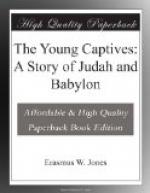Among the acquaintances of Barzello, with whom the king’s trusted officer had been on terms of intimacy for a long term of years, was one Joram, a rich merchant of the city. Joram was understood to have great influence at court, owing to the fact that he had traveled all over the then known world and possessed a valuable knowledge of many nations. His life was a mysterious one, and, while he was credited with being the richest man in Babylon, he was little seen outside of his place of business; but many politicians consulted him, and the king had been known to send his chariot for Joram day after day when great affairs of state were on hand. It had also leaked out that people of distinction from other countries visited the great merchant, and it was correctly surmised in political circles that Joram had helped to shape many a commercial treaty in the interests of the Babylonian monarch.
With all his mystery and reticence and secret power, Joram was a loyal subject of Nebuchadnezzar and ably seconded the king’s efforts for advancing the greatness of Babylon. His family consisted of his wife and an adopted son. The latter was a young man of fine attainments, and was being educated in statecraft as well as mercantile affairs.
Early one evening Barzello had succeeded in persuading Joram to accompany him home. He had spoken of the young captives and the beautiful Perreeza, and wished the merchant and his family to know them. The two elderly men were accompanied to the officer’s house by Mathias, the adopted son of Joram. They were warmly greeted by Jupheena, who smilingly conducted Mathias to another part of the house for the purpose of introducing him to Perreeza.
“Maid of Judah,” said Jupheena, “I have the pleasure of presenting thee to the honorable Mathias, son of our most excellent Joram.”
At these words the maid arose with calmness and beautiful dignity, appearing like an angel in human form, and gently responded to the very low bow of the young Babylonian. The conversation soon became animated. Mathias talked with all the warmth of his noble nature, producing a very favorable impression on the mind of the maid of Judah.
“To me it is quite refreshing,” said Perreeza, “to hear a name that is familiar in Israel. I have many relatives in Judah who are called by thy name.”
“Our national feelings are strong,” said the young man, “and, if I have learned correctly, this feeling is said to be stronger in the Hebrew heart than in all others.”
“I am not so well prepared to vouch for the correctness of the sentiment,” said Perreeza, “but if my own feelings be an index to the sentiments of others of my nation, the saying is abundantly true.”
“It is certainly an admirable trait of character,” said the young man, “and the individual in a foreign land who can think of the home of his fathers without strong emotion is not, in my opinion, an individual to be envied.”




